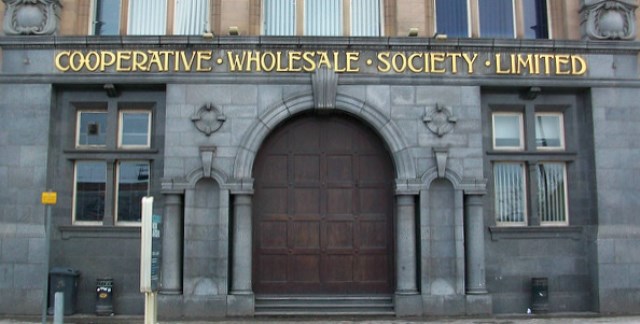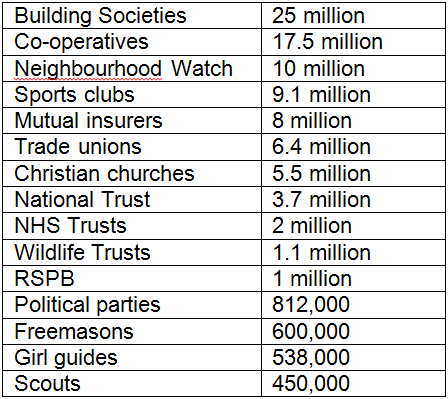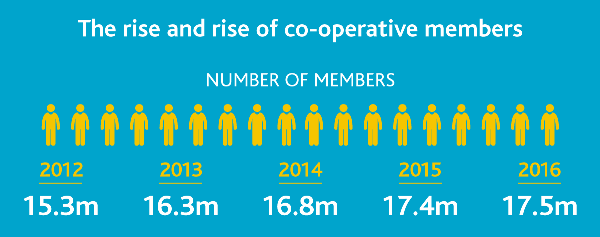A nation of members: Civic participation through membership in the UK
As Co-operatives UK launches a new report setting out the performance of the UK’s dynamic co-operative sector, its Secretary General, Ed Mayo, looks at what it means to be a member in today’s society.

Photo for illustration only. Credit: Bowstones CC BY-NC 2.0
Being a member of a club, a community or a cause is part of who we are. It is rare to find someone who does not belong to any group. It is also rare to find someone for whom being a member doesn’t also change, in subtle ways, how they interact with others and how they view themselves. There is such a thing as society, and membership is one of the building blocks.
Membership, in fact, is part of a wider field of civic participation. You can sign a petition, click to like an online campaign or donate money. All these actions are part of a healthy democracy and are acts of citizenship, but they go wider than membership. Membership and participation have a similar flavour, but membership suggests something relational, something longer term. It is closer to what the late Paul Hirst characterised as bringing the values of ‘associative democracy’.
The patterns and shapes of membership are hard to pin down. There is an extraordinary mix to what goes by the name of member – some of it a shallow, commercial spin designed to hide a traditional passive, and sometimes captive, customer relationship. Co-ops, as businesses owned by those involved in the business, are all about their members – as opposed to more distant investors that own shareholder companies. So, it feels right that we should try to understand this great nation of members by starting from what the nation understands by great membership.
Good membership, it emerges, can be seen most clearly as a two-way relationship between an individual and an institution. In a poll we carried out with You Gov, we found that people think the best membership organisations do five things:
- keep them informed,
- give them a say,
- treat them with respect,
- allow them a vote and
- offer them opportunities to get involved.
What underpins this, in terms of social psychology, appears to be that great forms of membership are ones that offer identity and control.
We can this as a way to select across that mix of membership schemes to weed out membership schemes that are really only one-way models. Having a loyalty card for a coffee chain gives you no voice. Being a friend of a museum gives you no vote. For the most part, anyway. From this, we can identify the top 15 membership networks in the UK. These are:
There has never been a Doomsday Book for members in the UK, so this is far from the final word. What are the next fifteen? Or fifteen hundred? Our intention has been to open up the conversation on membership, rather than close it down, and we would be delighted to find others.
In England and Wales, for example, the Charity Commission estimates that there are around 80,000 charities that have a membership structure. These come in different forms. A number of the disability charities have members, often with a democratic model where members are able to vote on who gets on the governing board (even if that the board remain in formal terms trustees of the charity rather than directors acting as representatives of member interests). In the disability field, over many years, this shift has been key to the move away from a tradition of paternalism, acting ‘for’ people with disabilities to a model in which action is led by people with disabilities. The great participatory slogan has been ‘nothing about us, without us’.
So, how many members are there in the UK? Just drawing on our top fifteen membership networks, we conclude that there are over 91 million in total. Not surprisingly, there are more members than people in the UK, because we are members many times over. But still, this is a dramatic number – for comparison, it is ten times the number of individual shareholders in the UK. Can we imagine the television news, where member ups and downs were treated with the same profile and respect as stocks and shares?
The co-operative and mutual sectors – powered by the likes of mass member owned businesses like the Co-op Group and Nationwide – forms the largest part of the UK’s membership figures. This is going to get larger too. The Co-op recently relaunched its membership scheme, so that 5% of own brand purchases are returned to members, and 1% to their communities – and aims to recruit one million new members over the next period.
We have just released the UK co-operative economy 2016, annual data on the sector, which point to a significant increase over the five years in the number of members of co-ops. Together, the largest co-ops and mutuals are the UK’s largest formal membership networks. They offer a mix that has worked well over time of self-help (personal gain) and mutual aid (identity and shared benefits) plus the potential for a genuine voice for members. But they are not alone – and the voluntary and community sector, sports and more recently public services are membership models that are on the rise. And with technology platforms making it easier and more cost-effective to operate membership systems, members are likely to be part of national life for years to come. We are a nation of members.
—
Note: You can view the full report at www.uk.coop/economy2016. This post represents the views of the authors and not those of Democratic Audit or the LSE. Please read our comments policy before posting.
—
 Ed Mayo is Secretary General of Co-operatives UK, the network for Britain’s thousands of co-operative businesses.
Ed Mayo is Secretary General of Co-operatives UK, the network for Britain’s thousands of co-operative businesses.







 Democratic Audit's core funding is provided by the Joseph Rowntree Charitable Trust. Additional funding is provided by the London School of Economics.
Democratic Audit's core funding is provided by the Joseph Rowntree Charitable Trust. Additional funding is provided by the London School of Economics.
A nation of members: Civic participation through membership in the UK https://t.co/YbhZKIR9Gm
A nation of members: Civic participation through membership in the UK https://t.co/Mhch35x8Zl
Our trustee @edmayo1 on #civicparticipation through membership for @democraticaudit https://t.co/4qKzqsoFXn
Great piece by @democraticaudit on #Civic #participation through #membership in the UK. Read more about it here: https://t.co/vLMVO9wkWW
A nation of members: Civic participation through membership in the UK https://t.co/H7Hzfw6c0O
A nation of members: Civic participation through membership in the UK https://t.co/NazFlXhJdq Maybe leave out Building Societies though?
A nation of members: Civic participation through membership in the UK https://t.co/WAHMXFDSM3
A nation of members: Civic participation through membership in the UK https://t.co/vvp8ZeP5yt @edmayo1 @CooperativesUK via @democraticaudit
“Nothing about us, without us”: Civic participation through membership & sense of belonging @edmayo1 @CooperativesUK https://t.co/7O8Xxvyx0E
A nation of members: Civic participation through membership in the UK https://t.co/NazFlXhJdq
A nation of members: Civic participation through membership in the UK https://t.co/xmWPwGFxne https://t.co/MLVW0OAhd8